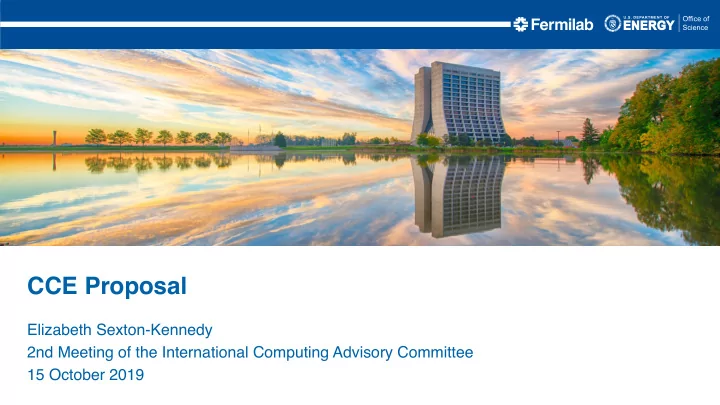

CCE Proposal Elizabeth Sexton-Kennedy 2nd Meeting of the International Computing Advisory Committee 15 October 2019
CCE Proposal • “In this proposal we will focus primarily on the needs of the HEP experiments (the theory/modeling …supported by ECP and SciDAC) with a view to exploiting the large-scale computational resources available at the ASCR-supported Leadership Computing Facilities (ALCF and OLCF) and at NERSC.” • “The cross-cutting nature of the problem means that there is an excellent opportunity for HEP researchers to collaborate with HPC experts (from the ASCR side) in exploring the possible solution space and in implementing initial solutions that can then be scaled up to the needs of the experiments. - ATLAS and CMS, LBNF/DUNE, CMB-S4, DESI, and LSST • 2 15/10/2019 Liz Sexton-Kennedy | 2nd Meeting of the International Computing Advisory Committee
CCE Proposal • This proposal team will consist of HPC experts with both ASCR and HEP backgrounds, and computational experts from the HEP experiments. The com- bined expertise will cover deep knowledge of next-generation HPC architectures and systems, HPC software and performance optimization, the experiments’ software base and HEP computing facilities (at BNL and FNAL) • 3 year timeline for the project, from now until around FY22/23 motivated by - Significant HEP milestones • Run 3 LHC, • LSST data taking, • 2nd Beam run for protoDUNE / SBND - Exascale machines anticipated to be available in 2022 - AI for Science initiative might be starting at roughly this time, as the ECP project ramps down - SciDAC-5 is expected to evolve from the current SciDAC-4 program 3 15/10/2019 Liz Sexton-Kennedy | 2nd Meeting of the International Computing Advisory Committee
CCE Management Chris Jones 4 15/10/2019 Liz Sexton-Kennedy | 2nd Meeting of the International Computing Advisory Committee
FTE Budget of the Proposal • Portable Parallelization Strategies: - 1FTE@ANL, 1.5FTE@BNL, 1FTE@FNAL, 1FTE@LBNL • Fine-Grained I/O and Storage: - 0.5FTE@ANL, 0.5FTE@BNL, 0.5FTE@FNAL, 0.5FTE@LBNL • Event Generators: - 0.5FTE@ANL, 0.5FTE@FNAL • Complex Workflows: - 1FTE@ANL, 1FTE@LBNL • 0.3FTE at BNL, FNAL, and LBNL for management and 1FTE of contingency held by HEP 5 15/10/2019 Liz Sexton-Kennedy | 2nd Meeting of the International Computing Advisory Committee
Complex Workflows • It is a request from the DESC part of LSST • HPC systems are not natively designed for handling complex, dynamic workflows and neither is the standard HPC software stack. As HPC systems begin to handle data-intensive tasks more routinely, there is a significant effort in making complex workflows run at the LCFs and at NERSC at scale. Cosmic Frontier workflows are a natural first target for this activity as DESI and LSST DESC both have been running recently in this mode at the LCFs and at NERSC. This is also a good mechanism to test the use of higher-level productivity languages on these systems. 6 15/10/2019 Liz Sexton-Kennedy | 2nd Meeting of the International Computing Advisory Committee
Recommend
More recommend